Every student yearns to excel in their studies, but success requires more than just attending classes and studying sporadically. To maximize your academic potential, a well-crafted game plan is essential. This comprehensive guide will provide you with the blueprint for a successful academic journey, covering everything from effective strategies to common mistakes to avoid.

Laying the Foundation: Establishing a Strong Academic Foundation
1. Set Clear Goals:
Define your academic aspirations and establish specific, achievable goals for each course. Break down large goals into smaller, manageable milestones.
2. Create a Structured Schedule:
Allocate dedicated time slots for studying, assignments, and extracurricular activities. Stick to this schedule as much as possible to maintain consistency and avoid procrastination.
3. Develop Effective Study Habits:
Engage in active learning techniques such as summarizing, highlighting, and reciting information. Utilize different study methods to cater to your preferred learning style.
4. Seek Support When Needed:
Don’t hesitate to ask for help from professors, teaching assistants, or classmates. Seeking clarification and additional guidance can significantly boost your understanding.
Strategies for Success: Proven Techniques for Academic Excellence
1. Active Participation in Class:
Prepare for lectures by reviewing the material beforehand. Take notes, ask questions, and engage in discussions to maximize your comprehension.
2. Consistent Study and Review:
Regularly revisit and review course material to reinforce your understanding. Break up study sessions into smaller intervals to improve retention.
3. Utilize Technology Wisely:
Leverage online resources, such as videos, simulations, and discussion forums, to supplement your studies. Use technology to create study aids like flashcards or summaries.
4. Collaborate with Peers:
Form study groups or connect with classmates to discuss concepts, share notes, and engage in collaborative learning.
5. Manage Your Time Effectively:
Prioritize tasks based on importance and urgency. Use time management tools like planners, to-do lists, or apps to stay organized and avoid overwhelming yourself.
Common Mistakes to Avoid: Pitfalls to Steer Clear of
1. Procrastination:
Put off assignments and studying until the last minute, leading to stress, poor performance, and missed deadlines.
2. Ineffective Study Methods:
Relying solely on passive learning techniques like reading and re-reading. Without active engagement, material is less likely to be retained.
3. Lack of Focus:
Allowing distractions during study sessions or attending classes without full attention. Focus is essential for maximizing comprehension.
4. Ignoring Feedback:
Failing to seek feedback on assignments or exams. Feedback provides valuable insights into areas for improvement and ensures continuous progress.
5. Unrealistic Expectations:
Setting unattainable goals or expecting to excel without consistent effort. Realistic expectations promote motivation and prevent discouragement.
Frequently Asked Questions (FAQs): Addressing Common Student Concerns
1. How can I overcome procrastination?
Break down tasks into smaller steps, set realistic deadlines, and reward yourself for completing tasks. Additionally, use apps or accountability partners to stay on track.
2. What is the best way to improve my memory?
Active recall through techniques like flashcards, summarization, and reciting information. Also, incorporate regular breaks and engage in spaced repetition to strengthen memory retention.
3. How can I manage my stress levels during exams?
Prepare thoroughly, practice relaxation techniques such as deep breathing or meditation, and seek support from friends, family, or counselors if needed.
4. What if I don’t understand a concept?
Don’t hesitate to ask for clarification from professors, teaching assistants, or classmates. Attending office hours or seeking additional resources can provide the necessary support.
5. How can I improve my time management skills?
Use a planner or calendar to schedule tasks, prioritize based on importance, and break down large tasks into smaller, more manageable chunks.
6. What is the importance of a good night’s sleep?
Sleep is crucial for cognitive function, memory consolidation, and stress reduction. Aim for 7-9 hours of quality sleep each night.
Additional Resources
- American Psychological Association (APA): https://www.apa.org/topics/education/
- National Education Association (NEA): https://www.nea.org/professional-excellence/student-engagement
- Khan Academy: https://www.khanacademy.org/
- Coursera: https://www.coursera.org/
Conclusion
By implementing the strategies outlined in this student game plan, you can significantly improve your academic performance, maximize your learning potential, and achieve your educational goals. Remember to stay motivated, seek support when needed, and continuously strive for improvement. With consistent effort and a positive mindset, you can unlock your full academic potential and embark on a successful and fulfilling educational journey.
